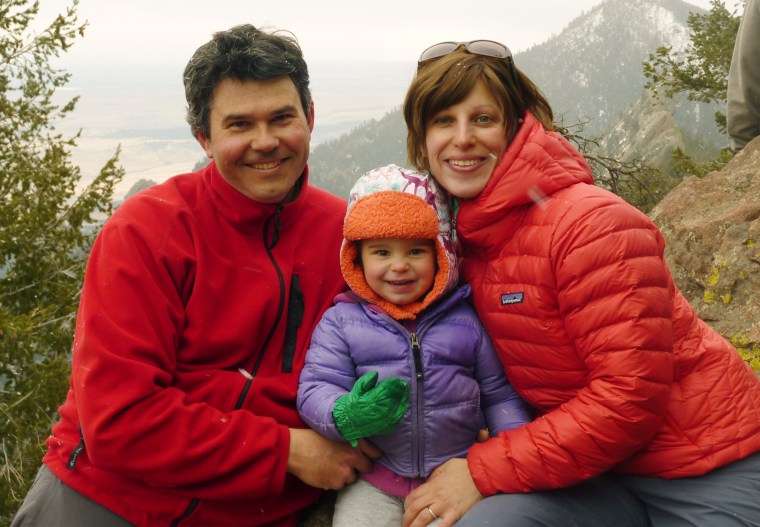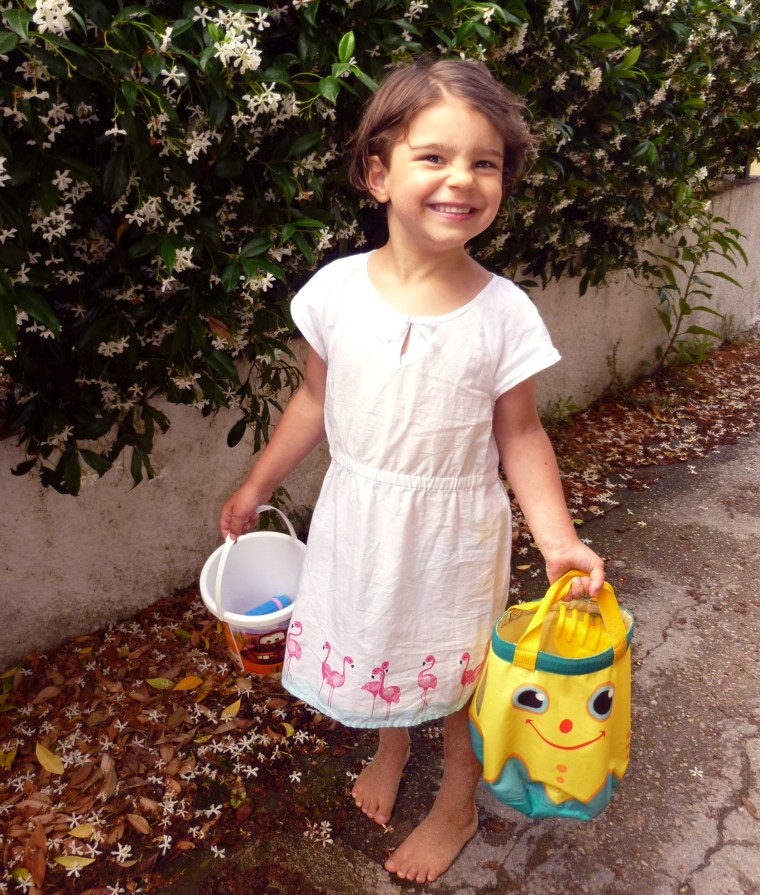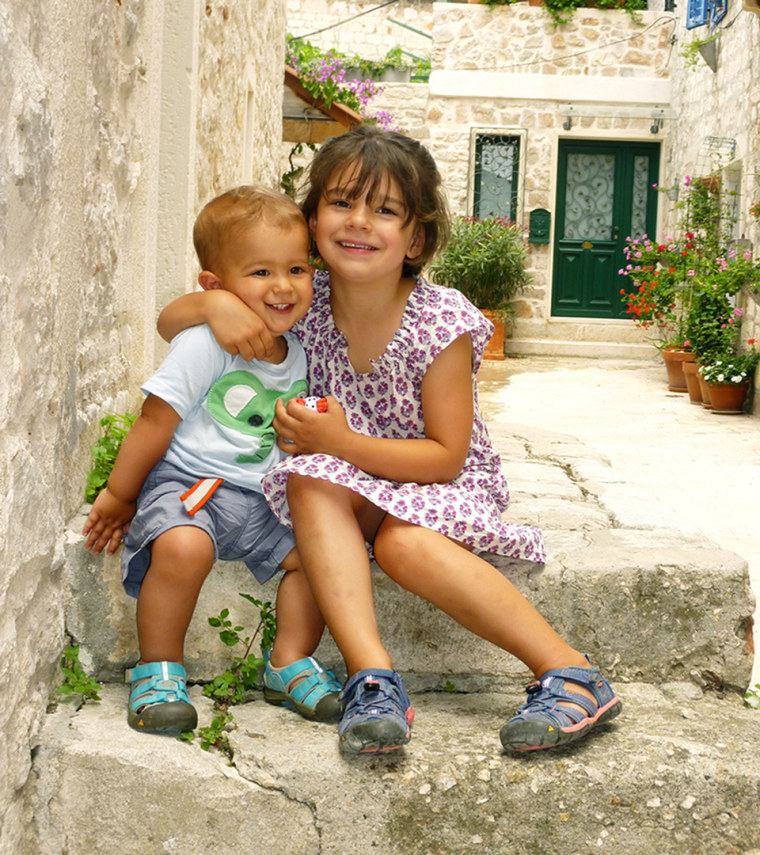UPDATE: Since Mila's mother, Julia Vitarello, shared her story with TODAY.com earlier this year, the family has raised the initial $1 million they needed to schedule a drug trial for next spring that might help Mila and other children with Batten disease. However, they now need to raise an additional $1 million before September or the drug trial will be canceled.
"There’s no other way to put it — my 6-year-old daughter, Mila, is dying. I lie by her side every night when she sleeps and my heart bleeds. My face burns from the tears," Vitarello wrote on the family's Go Fund Me campaign page.
"No words can describe watching Mila lose her vision, her ability to talk and walk. Mila still has her laughter and excitement for life. But we know this too will soon start to fade. The path to a cure exists. We're racing against time, and money is our only barrier."
To help raise money for the drug trial to combat Mila's form of Batten disease or to donate to the cause, see the Saving Mila campaign page on Go Fund Me.
Julia Vitarello is racing against the clock to save her child's life.
Her daughter Mila's symptoms began slowly: Though she was already used to hiking with her parents, Mila's foot started turning inward when she was 3 years old, and she became more awkward. Doctors told her parents that could be normal. Then, she began repeating herself, or she wasn't able to finish her sentences. "She'll grow out of it," they told Vitarello and her husband, Alek Makovec, an aerospace engineer.
Though Vitarello was worried about the changes in her daughter, "She was still functioning," Mila's mom said. "My friends told me, 'You're crazy! She's fine!'"
But when Mila started leaning far down over her books or pulling them much closer to her face to read them, Vitarello began taking Mila from one doctor to the next. They tested Mila for autism, but that was not her problem. "I thought, 'They're just not getting it,'" Vitarello said. "All these people were telling us different things."
By the time she was 5, Mila's parents knew something was really wrong. She started doing a frantic, involuntary stepping movement with her feet until she would fall over, and her eyesight was blurry and she was checked for hallucinations or seizures. "No matter where I went, people had never seen her symptoms before. They couldn't figure out what it was," said Vitarello.
Up late one night searching the internet, Vitarello realized that Mila's symptoms matched Batten disease — a rare, deadly disorder. She tried to get her an appointment with a neurologist at a local children's hospital the next day, but the doctor was booked for months. Vitarello told her husband they were going to have to take Mila to the emergency room. "We knew they were never going to let her leave the hospital with her symptoms," Vitarello said.

Never miss a parenting story from TODAY.com! Sign up for our newsletter here.
Mila was formally diagnosed with Batten disease this fall, and her condition has quickly declined. On her sixth birthday, Nov. 5, she could still see; now, she is 100 percent blind. She has a hard time walking or talking, but her spirits are still good. "She's still Mila," said her mother.
Batten disease is a rare, inherited disorder of the nervous system that causes seizures, visual impairment, personality and behavioral changes, dementia, the loss of all motor skills, and early death.
There is no cure ... yet. Mila's family and many others are working frantically to raise money for clinical trials that could save their children's lives.
"I will do anything to make this happen," Vitarello said. "Nothing in my life matters anymore. I’m not depressed. I’m sad. My whole life focus is my daughter. That's why families can make such a difference in science — they are more motivated than anyone to make things happen."
According to the Batten Disease Support and Research Association, the Center for Disease Control (CDC) estimates 2-4 children out of 100,000 will be diagnosed with Batten disease. Families have reported receiving an average of 30 inaccurate diagnoses (such as autism or epilepsy) before finally finding the Batten diagnosis.

Helping Mila has become a full-time family focus. Through their foundation, Mila's Miracle Foundation, and website, Mila's parents are trying to raise $4 million as fast as possible to fund a clinical trial specifically for Mila's type of Batten. Other families, like the Gray family in Los Angeles, which has two daughters diagnosed with Batten and who have raised $6 million to date, are doing the same for the variants afflicting their own children.
Batten disease has 14 different known variants, and each variant will require its own separate clinical trial and research.
For Mila, there is currently no trial and no medicine available. But there is reason to have hope, says her mother, because scientists are "very motivated to fix this."
"We’re not going to have a cure tomorrow, but we are making a lot of progress right now," said Vitarello. "In five years, there could be a cure."
In the meantime, Vitarello said she tries not to make the present "any heavier than it needs to be" for Mila and her 2-year-old brother. She and her husband encourage Mila to keep eating with her hands to help maintain her motor function, take her for walks outside, massage her hands often and make sure she sleeps well at night.
"My goal right now is to keep Mila as healthy and happy as possible and to raise $4 million," said Vitarello. "I can’t get the scientists to work on this unless we have the money, and science is expensive. I need to be able to fund these labs."
"I will do anything to make this happen," she said. "Nothing in my life matters anymore. I’m not depressed. I’m sad. My whole life focus is my daughter. That's why families can make such a difference in science — they are more motivated than anyone to make things happen."

With the help of an aide, Mila is able to attend a one-room preschool with her 2-year-old brother, Azlan. Vitarello told TODAY Parents she recently talked to Azlan about the fact that Mila can no longer see and that some of the other children at school might need help understanding why her body moves differently than theirs. She asked Azlan if he could help explain Mila's situation to their classmates.
"I will help you," Azlan replied. "I will help."
To make a donation to Mila's Miracle Foundation, visit StopBatten.org.